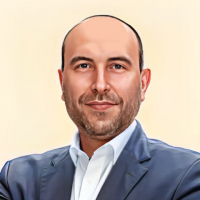
Several chief investment officers from Dutch private banks have raised concerns about the «great danger» of consensus forecasts on US equities for 2025. This shared apprehension has prompted ING and Van Lanschot Kempen to re-evaluate their weighting towards European equities.
These insights emerged during a debate held in Amsterdam on Thursday, marking the Investment Officer Outlook 2025. Panellists included Luc Aben of Van Lanschot Kempen, Iris van de Looij of InsingerGilissen, Mary Pieterse-Bloem of Rabobank, Ralph Wessels of ABN Amro, and Simon Wiersma of ING.
A consensus under scrutiny
At the close of last year, fund houses, asset managers, and banks globally converged on a shared forecast: the US economy would achieve a soft landing in 2025, while Europe’s economy would see only marginal growth. Dutch private banks largely echoed this view, maintaining a (moderate) overweight allocation to US equities compared to European equities.
However, the panel highlighted the risks of this consensus. Both Wiersma and Wessels pointed to historical evidence that consensus forecasts rarely materialise. Van de Looij noted the high valuations in the US, stating: «So much positive news has already been priced in. What if something deviates from expectations?»
Rethinking regional allocations
ING, citing high US equity valuations and relatively low valuations in Europe, is reconsidering its regional allocation. «At some point, something becomes too cheap to ignore,» said Wiersma. «Currently, we are still overweight US equities in our tactical asset allocation, but we are inclined to neutralise this against the benchmark.»
Van Lanschot Kempen’s chief economist, Luc Aben, shared a more cautious perspective: «If we were to adjust, it would be to slightly reduce our caution towards Europe compared to two months ago.»
Other banks remain firmly focused on the US, albeit with varying degrees of commitment. InsingerGilissen, for example, has begun diversifying its US portfolio, expanding into sectors such as financials, according to Van de Looij.
ABN Amro’s chief investment strategist, Ralph Wessels, warned against overly optimistic views of Europe’s potential outperformance. «Europe only outpaces the US in a negative market environment where lagging assets catch up. For Europe to truly outperform, we would need to see a bad stock market climate or significant policy changes, such as reduced tariffs imposed by Donald Trump.»
Pieterse-Bloem of Rabobank emphasised the economic resilience of the US, despite high valuations. «If you avoided US equities last year due to valuation concerns, you would have missed significant returns. Some things are cheap for a reason,» she said, adding, «Wage growth, productivity growth, profit growth—these factors make the US a compelling case. Sometimes, the consensus is right.»
Trump’s influence and inflation uncertainty
The discussion inevitably turned to Donald Trump and the potential implications of his policies. Aben predicted «a lot of noise,» while Wiersma suggested that Europe might benefit from adopting «a little Trump.» Van de Looij focused on Trump’s pressure on the Federal Reserve, while Pieterse-Bloem viewed his approach as mostly posturing: «Trump has launched numerous lightning rods, but how material are they? Inflation is the real crux of the issue.»
Wessels highlighted the economic impact of Trump’s proposed tariffs, predicting an initial growth boost for exporters in Europe and China due to inventory stockpiling. However, once tariffs are implemented, he foresees slower European growth and rising inflation.
Both Rabobank and InsingerGilissen are positioning for inflationary pressures by investing in inflation-linked assets. Rabobank has slightly reduced its exposure, while InsingerGilissen has recently built up its position.
Democratisation of private markets and sustainability
The panel also explored key themes such as the democratisation of private markets and sustainability. Most CIOs expect progress in opening private markets to retail investors. However, Pieterse-Bloem cautioned against overselling semi-liquid products: «Some are marketed as semi-liquid, but they are not. This can be dangerous.» Aben acknowledged the risks but argued that they apply to any portfolio.
Wessels warned that opening private markets could erode the illiquidity premium, reducing expected returns: «A significant portion of the asset class’s return stems from its illiquidity premium. Broadening access naturally diminishes this advantage.»
On sustainability, Pieterse-Bloem observed a shift towards recognising larger physical risks in portfolios that have yet to be fully priced in. Van de Looij noted the increasing polarisation of client attitudes towards sustainability: «A new narrative is needed. Currently, it seems like sustainability excludes other investments, which is not the case. We need a more intelligent approach.»
Final thoughts
As the debate concluded, moderator Gerben van Driel asked for closing remarks. Wiersma offered a sobering perspective: «The chances of everything discussed today coming true are slim.» Aben, however, struck an optimistic tone: «Optimism is our moral duty.»











